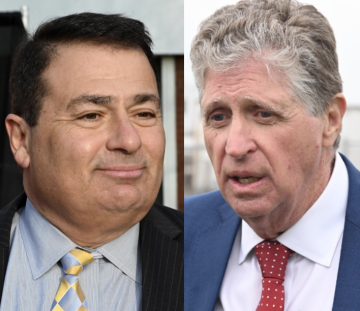What Does RI Have to Show for Billions in Federal Spending — See What Officials Say
Tuesday, January 16, 2024
Rhode Island received billions of federal dollars to address the public health and economic challenges of COVID.
So, is Rhode Island any better off?
Roughly $1.5 billion was left to the discretion of the governor and legislators to determine how the money was spent.
GET THE LATEST BREAKING NEWS HERE -- SIGN UP FOR GOLOCAL FREE DAILY EBLASTAnd, according to one private foundation, the expenditure in Rhode Island breaks out to be about $15,263 per capita. See how the Peter G. Foundation analyzed all the states' expenditures.
GoLocal asked Governor Dan McKee and legislative leaders and received Rhode Island spending reports.
According to McKee’s office, State Fiscal Recovery Funds “positively impacted health care facilities, affordable housing, local businesses, and our workforce."
McKee’s office could not answer the question of how Rhode Island was better for the expenditures. GoLocal asked repeatedly.
According to state data, while housing initiatives received the most dollars, the second largest recipient is the port of Davisville, which received $65 million to support, in part, Electric Boat’s activities. The company is a division of General Dynamics, the military contractor. McKee has claimed the expenditure is needed to support the offshore wind industry.
RI's Struggling Business Environment
On Tuesday, Rhode Island and McKee got bad news. A new report ranked Rhode Island as the worst state to start a business.
Under McKee, who took office in March of 2021, the state has continued to rank at the bottom of national business rankings, however.
As GoLocal reported in July of 2023, “Not much has changed in Rhode Island’s business climate since 2022, according to CNBC.”
According to the latest ranking for “America’s Top States for Business 2023” — Rhode Island, for the second year in a row, ranked #45 in the country.
“It is crucial that we reset expectations about the availability of federal funds and continue to budget responsibly,” said McKee spokesperson Andrea Palagin in a statement to GoLocal.
McKee is expected to unveil the framework of the Fiscal Year 2025 budget in his State of the State Address on Tuesday night.
Legislative Leaders Discuss the Impact
The state is expected to finish the current F24 fiscal year with a $98 million surplus based on the last revenue and caseload estimates in November.
Rhode Island's state budget is now roughly $14 billion — which grew by more than $4 billion over the course of the pandemic.
But as the influx of federal COVID-relief funds has nearly dried up, state elected officials will be tasked with reigning in spending.
“The ARPA funding provided by the federal government allowed the state to address critical needs of Rhode Islanders for housing, economic and workforce development, small business relief, public and behavioral health, and in so many other areas,” said House Speaker Joe Shekarchi. “The strategic investments we made were limited allocations aligning with the one-time nature of the funding. With these federal dollars now allocated, we will put together a balanced state budget in June by living within our current resources available.
“It is important to note that the funding appropriated by the General Assembly is in addition to federal relief provided separately to cities and town, school departments and many more specific programs managed by federal entities,” said Shekarchi. “Recipients of this other short-term relief will similarly be challenged with ensuring the benefits of the funding outlast the temporary nature of the support.”
Senate President Dominick Ruggerio said that he does not believe the state is in a precarious position without the influx of funds.
“Federal COVID relief and recovery funds were directed to a range of mainly one-time expenditures to assist Rhode Island residents and businesses struggling during those difficult times, and to make long-term investments to better position Rhode Island for the future. An example is the $100 million in rent relief funding allocated to help renters remain in their homes during the pandemic,” said Ruggerio. “Additionally, direct payments were made to assist hospitals, nursing homes, the Food Bank, child care workforce, mental health providers, and more. Grants were provided to assist businesses, and the unemployment fund was shored up to avoid a tax increase on small business. In addition to short-term pandemic relief efforts, we also made long-term investments in areas such as housing, roads and bridges, water treatment, bio-science, and more.
“Because of the one-time nature of the allocations of these federal dollars, Rhode Island is well positioned and is not facing a fiscal cliff,” he added.
Republican House Minority Leader Mike Chippendale, however, cautioned that the crafting of this year’s budget process will be critical.
“The upcoming FY2025 budget will serve to be one of the most important budgets in recent years, as it will establish the precedent as to whether or not the State will see a return on investment, or rather, create long-term financial liabilities to be supplemented with General Revenues (taxes),” said Chippendale. “Furthermore, it will be on the State to prove whether or not it is committed to its obligations as outlined in the FY2024 budget.”
Where the Money Went
While McKee’s office could not point to any initiative that transformed the state, they provided a breakdown of spending.
According to McKee’s Office, it was selective in what it claimed state dollars were spent on.
"For healthcare, $45 million was distributed to 12 hospitals; $30 million was distributed to 75 nursing homes; $13.7 million to support 45 pediatric practices for the treatment of at-risk children; and more than $6.5 million in grants for the certification of eight community behavioral health clinics across the state," said McKee's office.
All of these healthcare expenditures were one-time expenditures.
"For housing, $66 million was provided to the RI Department of Housing, which then awarded the funding to RI Housing for the development of affordable housing; 63 units were completed by September 30; $19.5 million in down payment assistance to help eligible Rhode Islanders purchase a house; and approximately $12 million in assistance to homeless individuals/families, including support for warming centers and shelters," said McKee's office.
As far as business and workforce assistance, the McKee administration pointed to $20.3 million in direct grants to 2,489 small businesses, 113 restaurants and event organizations, 26 hotel and travel businesses, and 24 arts and cultural organizations; $20 million distributed by the Rhode Island Foundation to 240 nonprofit organizations; $100 million contributed to the Unemployment Insurance Trust Fund to mitigate future unemployment taxes for Rhode Island businesses; $22.9 million in retention bonuses paid directly to more than 5,800 child care workers; approximately $15M in retention payments to stabilize the DCYF workforce; more than $10M in payments to nine early intervention providers, and more than $11 million in job training assistance provided to more than 3,800 unemployed and underemployed workers.”
In total, Rhode Island received $1.13 billion in federal pandemic recovery assistance — see how the monies were spent on the state's website.
Related Articles
- McKee’s Budget - No Tax or Fee Increases, $167M for Slater Hospital Over 7 Years
- RIPEC Cautions Against One-Time Spending in McKee’s FY23 Budget Proposal - and Future Deficits
- RI State Rep Wants Less Money in Budget for New State Police Barracks, More for Children’s Health
- RI’s Top Legislators Discuss Budget and End of Session Priorities
- Marijuana, Taxes on Sugary Drinks & PPP Loans: What’s In, What’s Not in RI House Finance FY22 Budget
- Neronha’s Budget Battle: Gov and Legislature Have Increased AG’s Funding 18% in Past 4 Years
- McKee Makes Case for $45 Million in Life Sciences Investments in FY24 Budget
- House Finance Approves $13.6B RI Budget: Mattiello’s Car Tax Phase-Out, No Gas Tax Relief
- Changes to Education Aid in FY 2024 RI Budget “Make Little Sense,” Says RIPEC
- RI’s Surprising Number: RI Budget Spending v. MA
- Winners and Losers in McKee’s Budget Proposal








